Charles E W Bean, Diaries, AWM38 3DRL 606/117/1 - September - December 1918 - Part 1
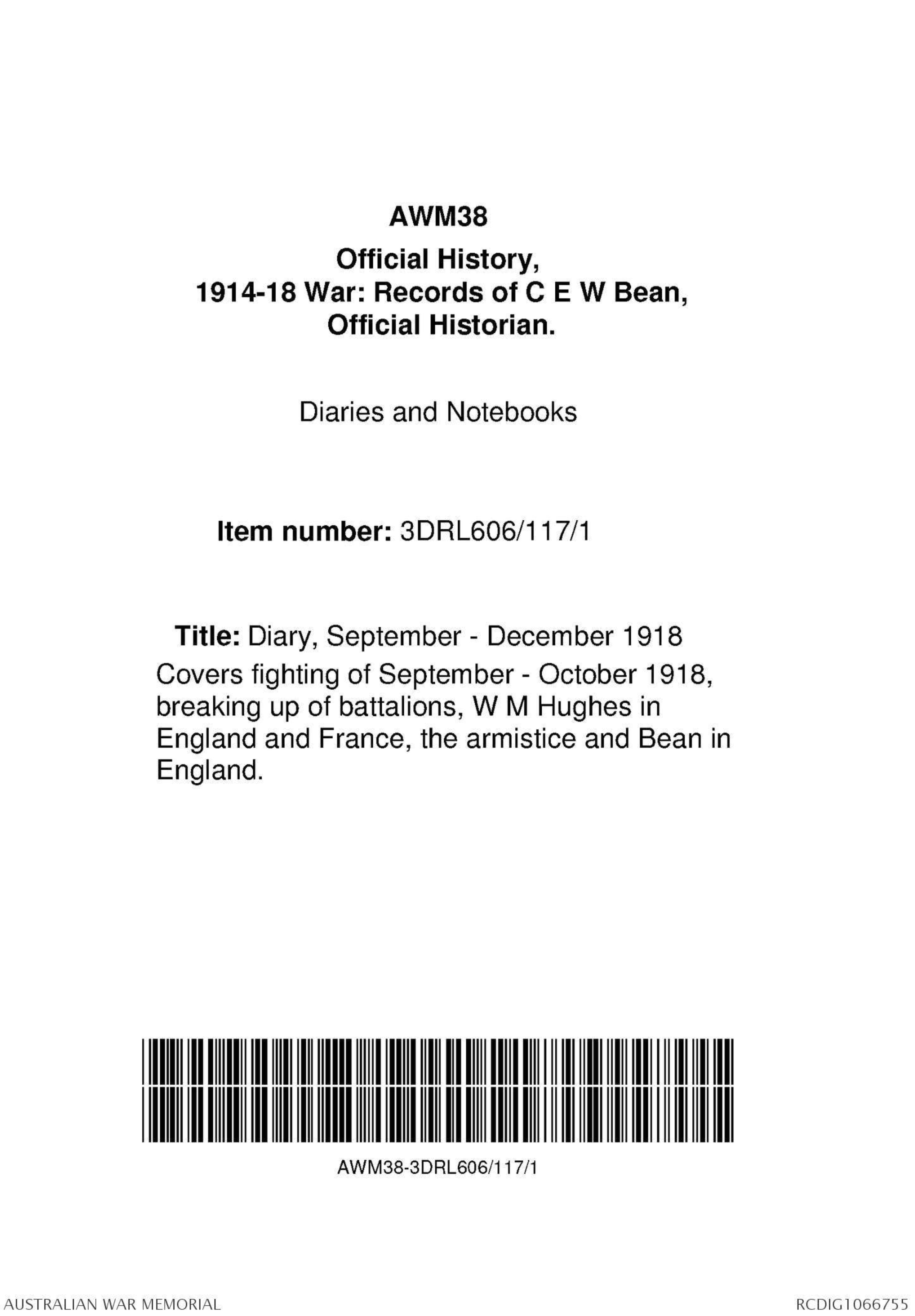
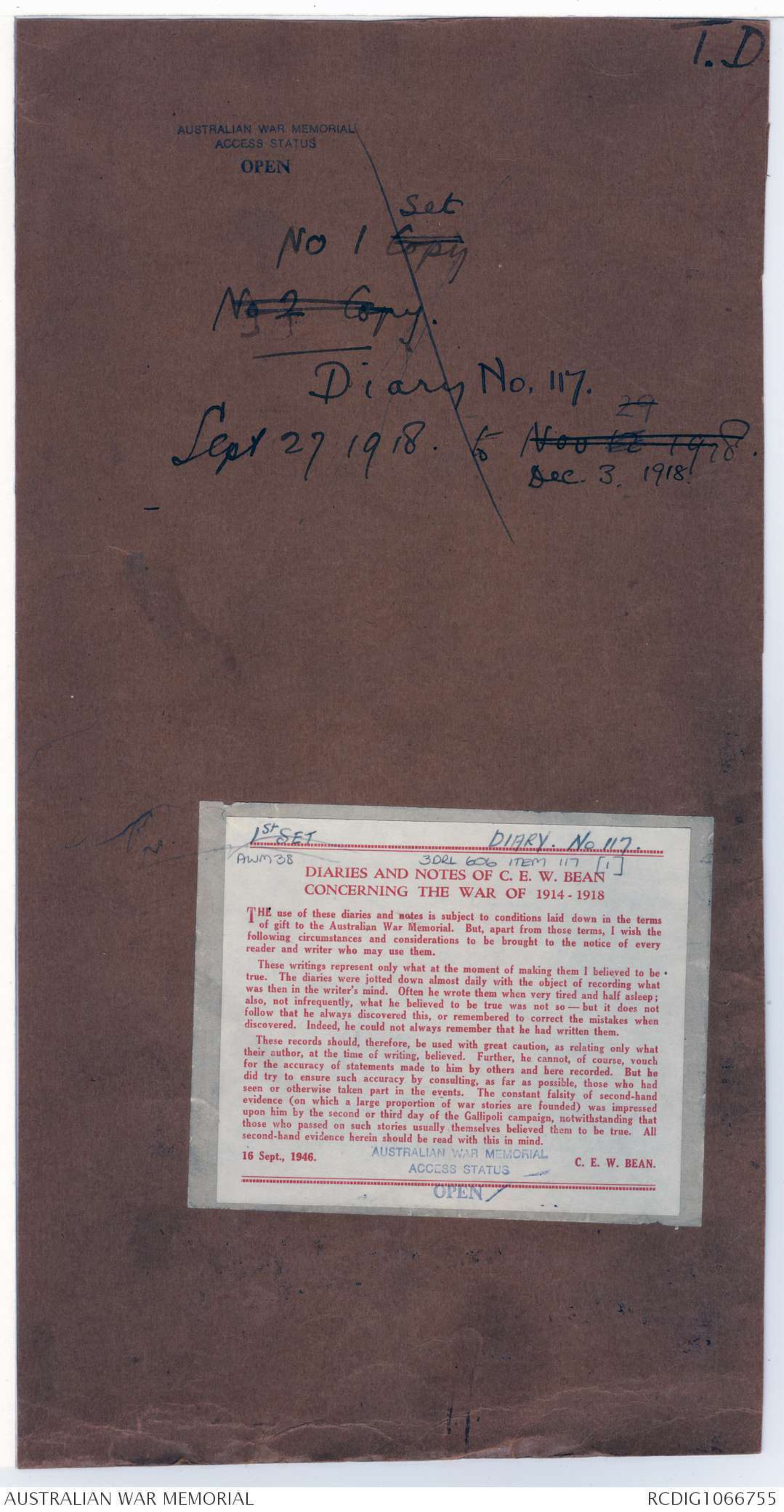
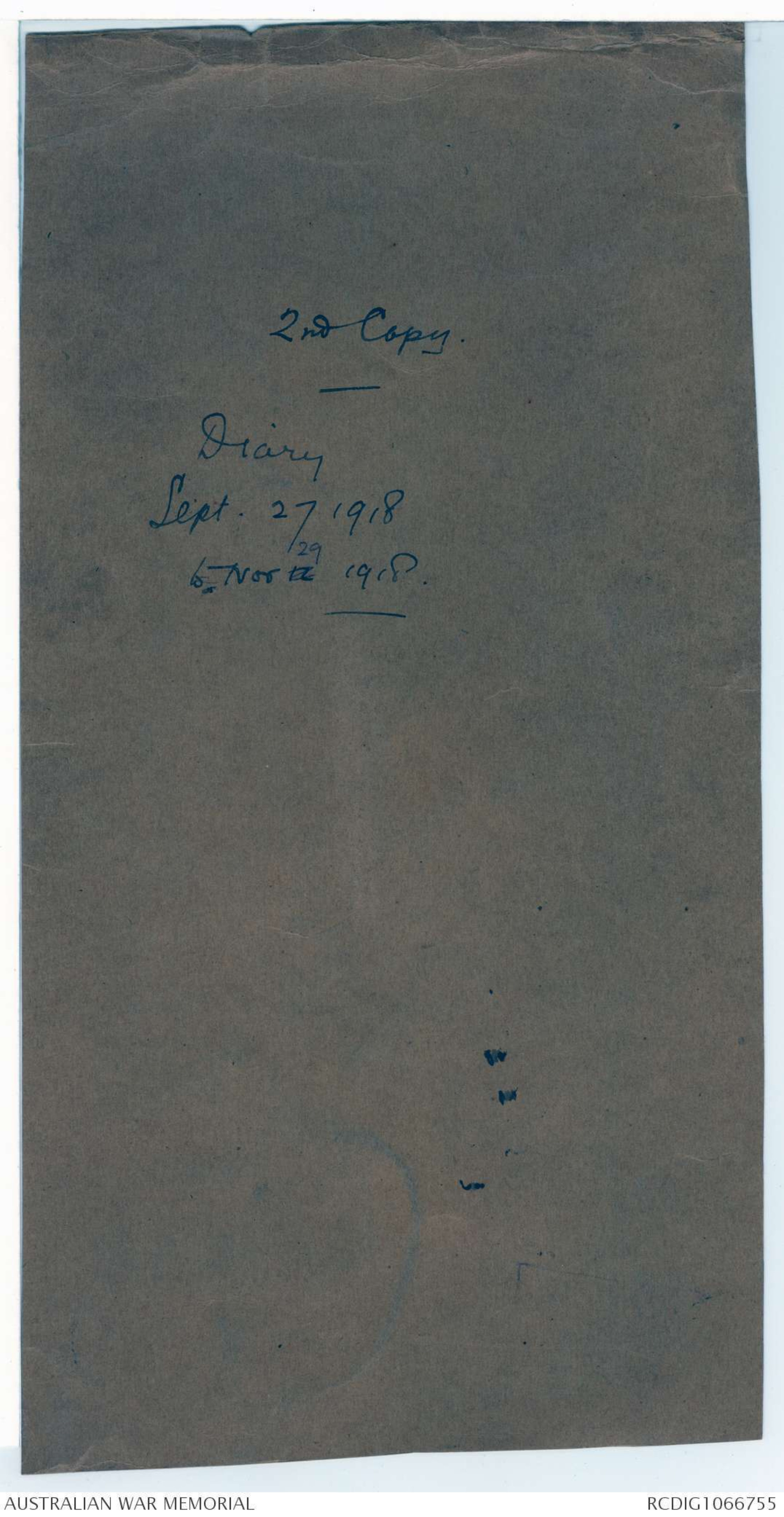
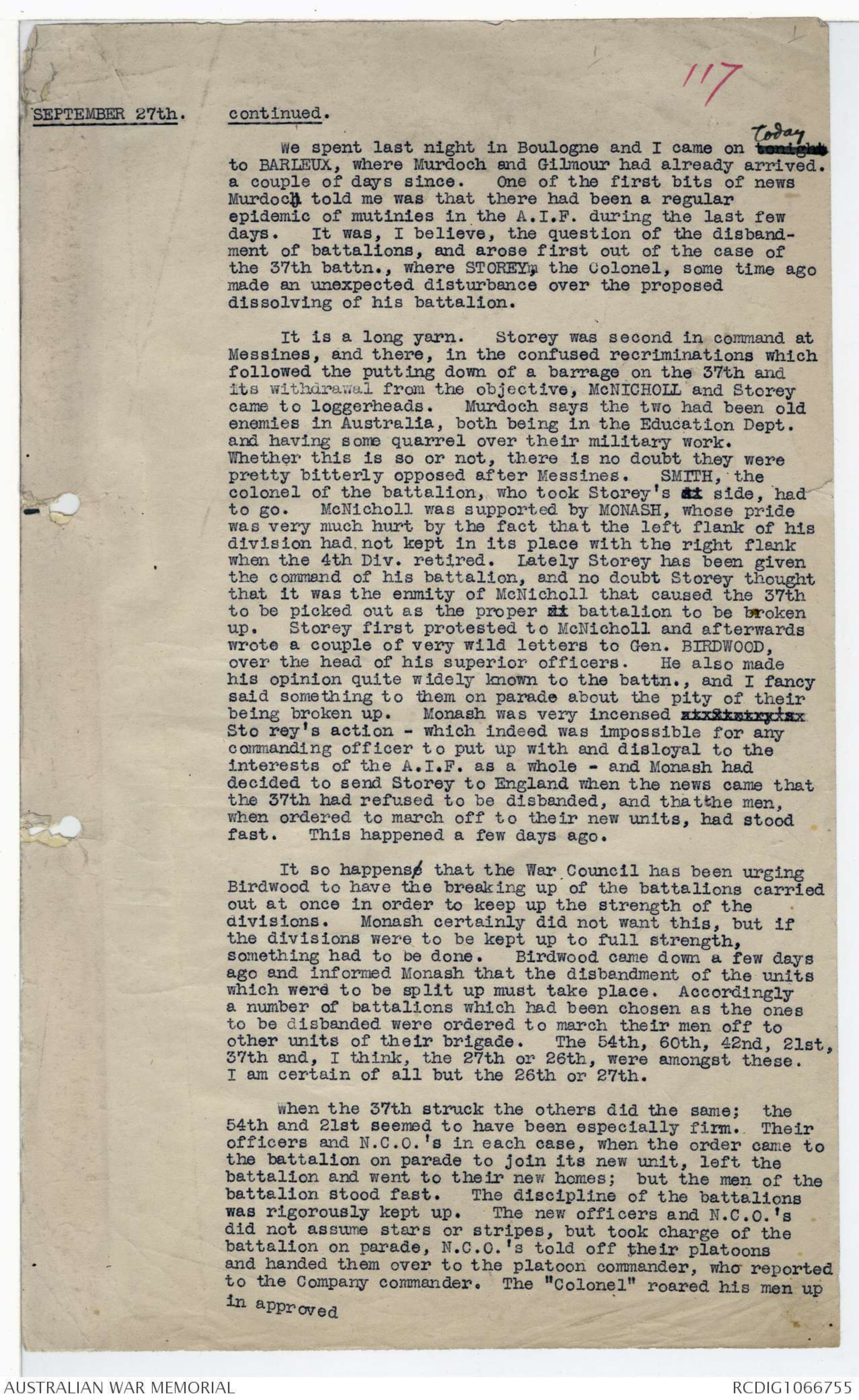
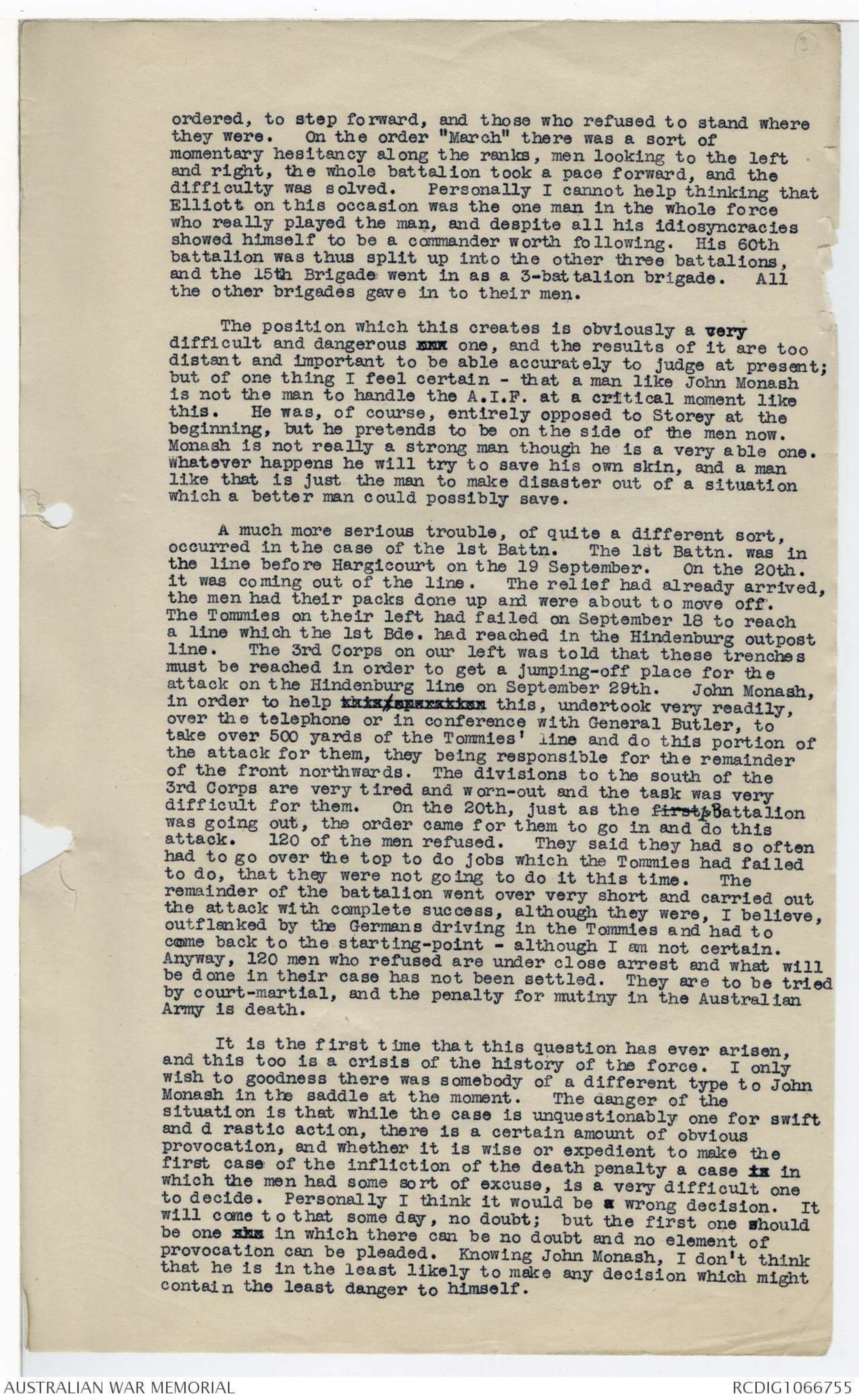
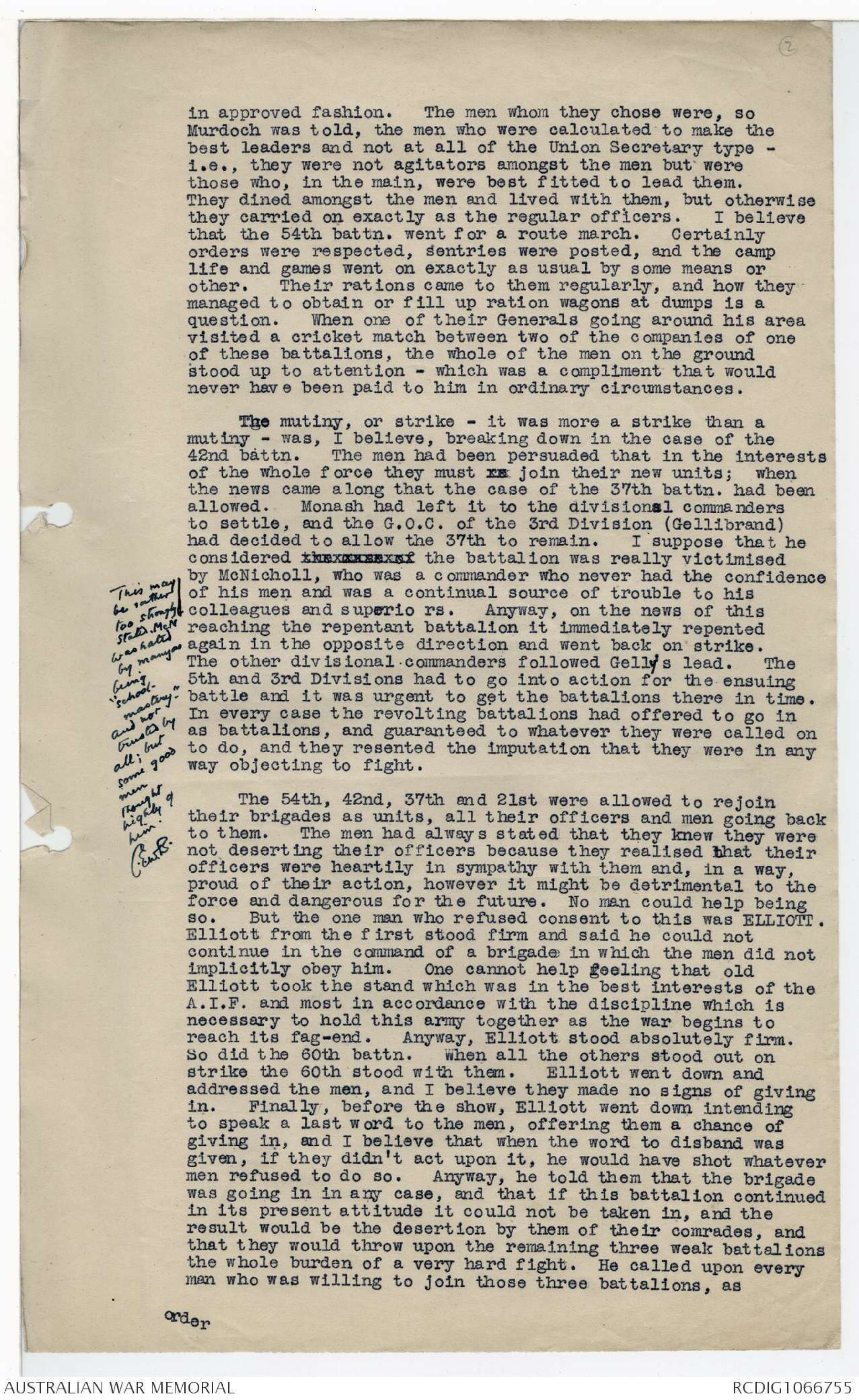
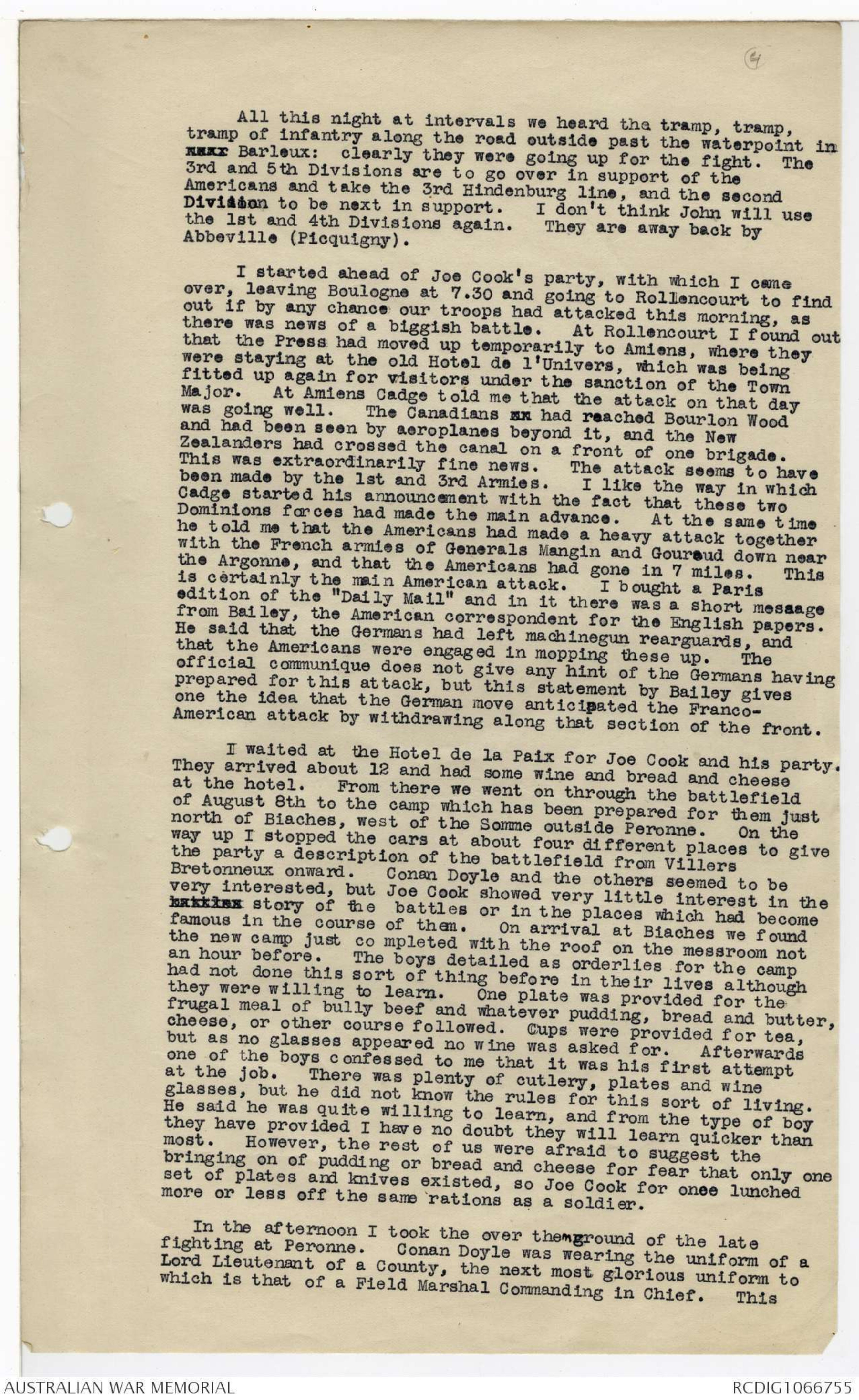
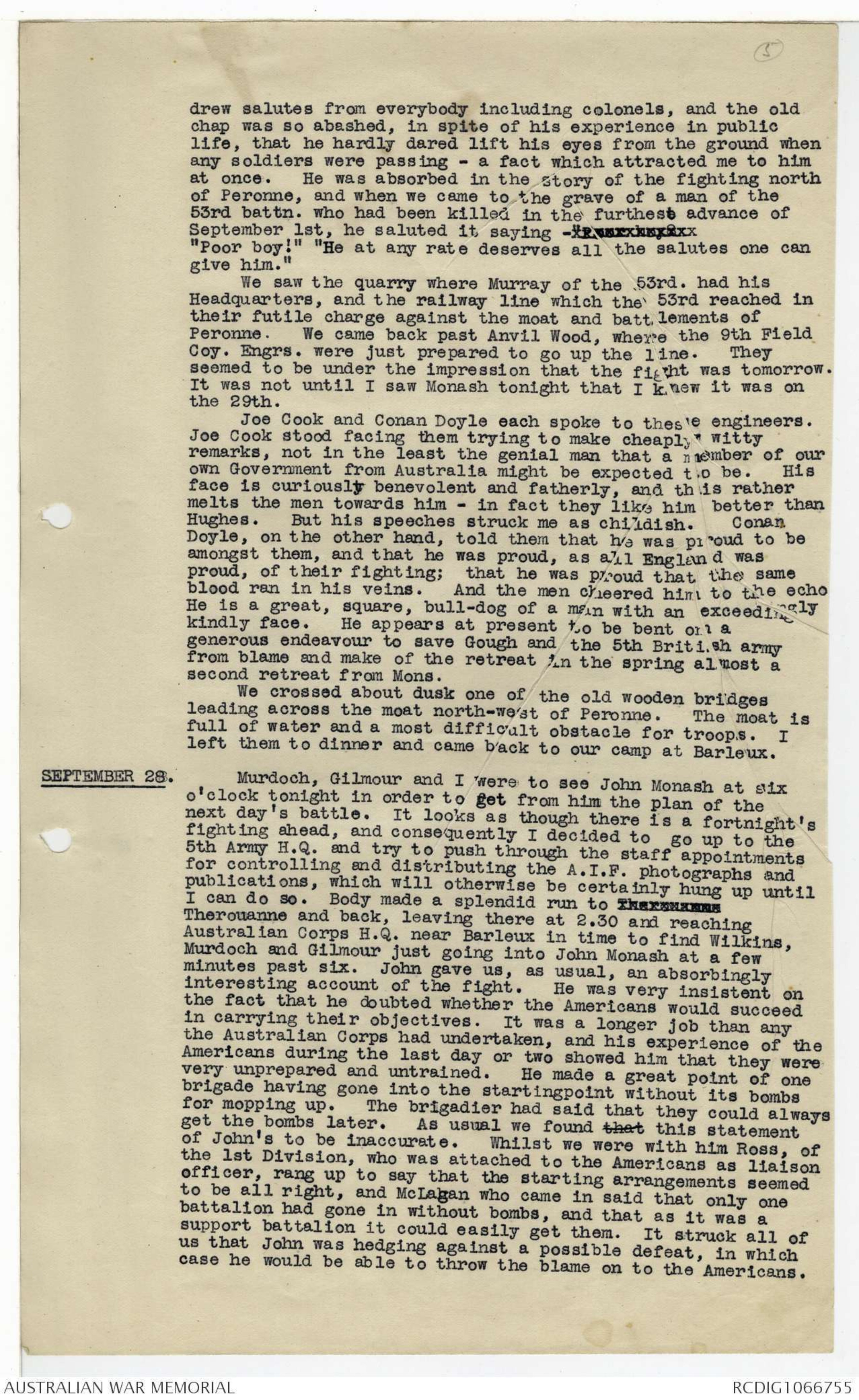
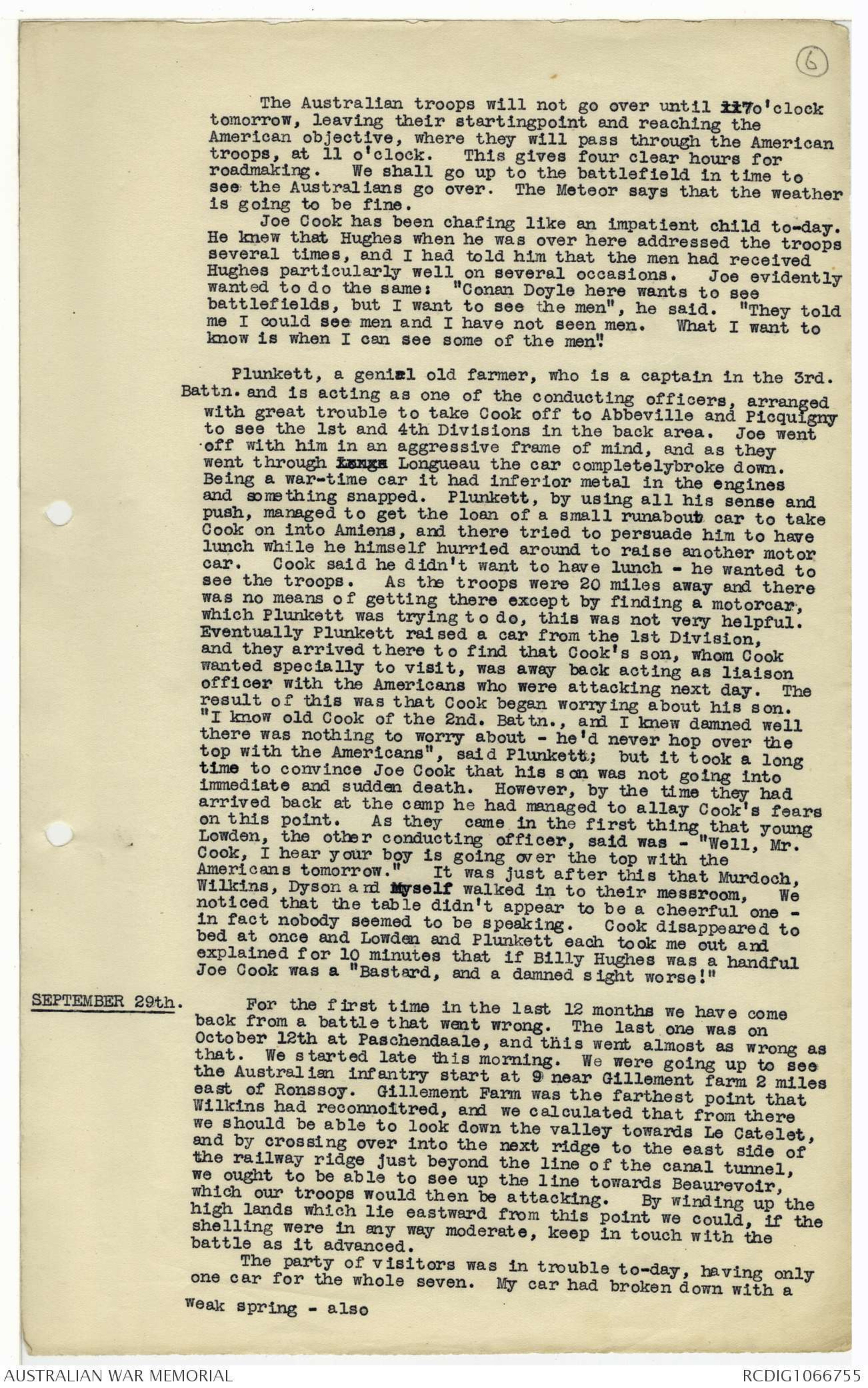
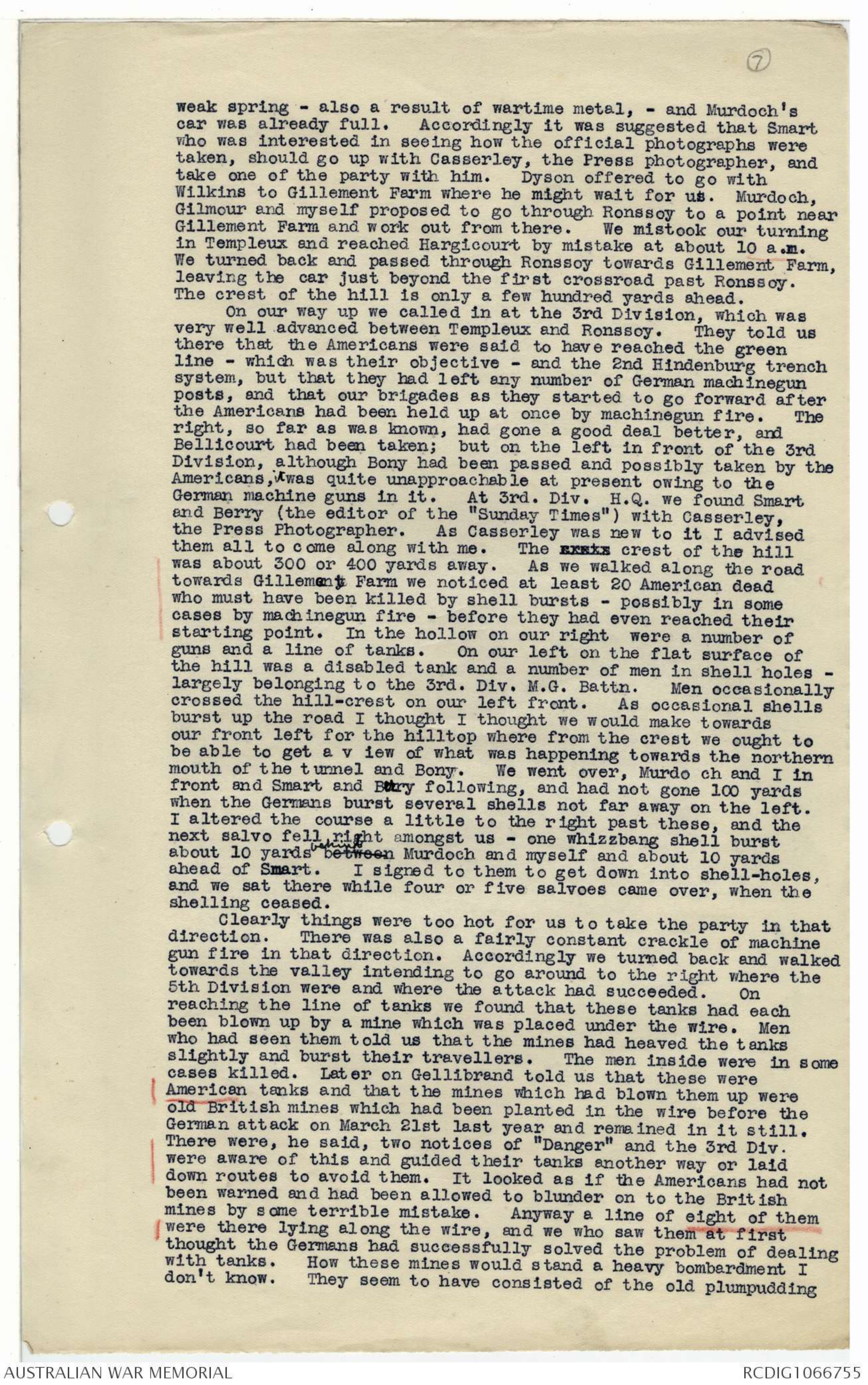
AWM38
Official History,
1914-18 War: Records of C E W Bean,
Official Historian.
Diaries and Notebooks
Item number: 3DRL606/117/1
Title: Diary, September - December 1918
Covers fighting of September - October 1918,
breaking up of battalions, W M Hughes in
England and France, the armistice and Bean in
England.
AWM38-3DRL606/117/1
T.D
AUSTRALIAN WAR MEMORIAL
ACCESS STATUS
OPEN
No 1 Copy SetNo 2 Copy
Diary No. 117.
Sept 27 1918. to Nov 12 29 1918 Dec. 3, 1918.
1st SET DIARY. No 117.
AWM38 3DRL 606 ITEM 117 [1]
DIARIES AND NOTES OF C. E. W. BEAN
CONCERNING THE WAR OF 1914-1918
THE use of these diaries and notes is subject to conditions laid down in the terms
of gift to the Australian War Memorial. But, apart from those terms, I wish the
following circumstances and considerations to be brought to the notice of every
reader and writer who may use them.
These writings represent only what at the moment of making them I believed to be
true. The diaries were jotted down almost daily with the object of recording what
was then in the writer's mind. Often he wrote them when very tired and half asleep;
also, not infrequently, what he believed to be true was not so – but it does not
follow that he always discovered this, or remembered to correct the mistakes when
discovered. Indeed, he could not always remember that he had written them.
These records should, therefore, be used with great caution, as relating only what
their author, at the time of writing, believed. Further, he cannot, of course, vouch
for the accuracy of statements made to him by others and here recorded. But he
did try to ensure such accuracy by consulting, as far as possible, those who had
seen or otherwise taken part in the events. The constant falsity of second-hand
evidence (on which a large proportion of war stories are founded) was impressed
upon him by the second or third day of the Gallipoli campaign, notwithstanding that those who passed on such stories usually themselves believed them to be true. All second-hand evidence herein should be read with this in mind.
16 Sept. 1946. C. E. W. BEAN.
AUSTRALIAN WAR MEMORIAL
ACCESS STATUS
OPEN
2nd Copy.
Diary
Sept. 27 1918
to Nov 16 29 1918.
1
SEPTEMBER 27th. continued. 117
We spent last night in Boulogne and I came on tonight today
to BARLEUX, where Murdoch and Gilmour had already arrived.
a couple of days since. One of the first bits of news
Murdoch told me was that there had been a regular
epidemic of mutinies in the A.I.F. during the last few
days. It was, I believe, the question of the disbandment
of battalions, and arose first out of the case of
the 37th battn., where STOREYm, the Colonel, some time ago
made an unexpected disturbance over the proposed
dissolving of his battalion.
It is a long yarn. Storey was second in command at
Messines, and there, in the confused recriminations which
followed the putting down of a barrage on the 37th and
its withdrawal from the objective, McNICHOLL and Storey
came to loggerheads. Murdoch says the two had been old
enemies in Australia, both being in the Education Dept.
and having some quarrel over their military work.
Whether this is so or not, there is no doubt they were
pretty bitterly opposed after Messines. SMITH, the
colonel of the battalion, who took Storey's xx side, had
to go. McNicholl was supported by MONASH, whose pride
was very much hurt by the fact that the left flank of his
division had not kept in its place with the right flank
when the 4th Div. retired. Lately Storey has been given
the command of his battalion, and no doubt Storey thought
that it was the enmity of McNicholl that caused the 37th
to be picked out as the proper st battalion to be broken
up. Storey first protested to McNicholl and afterwards
wrote a couple of very wild letters to Gen. BIRDWOOD,
over the head of his superior officers. He also made
his opinion quite widely known to the battn., and I fancy
said something to them on parade about the pity of their
being broken up. Monash was very incensed xxxxxxxx
Sto rey's action - which indeed was impossible for any
commanding officer to put up with and disloyal to the
interests of the A.I.F. as a whole - and Monash had
decided to send Storey to England when the news came that
the 37th had refused to be disbanded, and that the men,
when ordered to march off to their new units, had stood
fast. This happened a few days ago.
It so happense that the War Council has been urging
Birdwood to have the breaking up of the battalions carried
out at once in order to keep up the strength of the
divisions. Monash certainly did not want this, but if
the divisions were to be kept up to full strength,
something had to be done. Birdwood came down a few days
ago and informed Monash that the disbandment of the units
which were to be split up must take place. Accordingly
a number of battalions which had been chosen as the ones
to be disbanded were ordered to march their men off to
other units of their brigade. The 54th, 60th, 42nd, 21st,
37th and, I think, the 27th or 26th, were amongst these.
I am certain of all but the 26th or 27th.
When the 37th struck the others did the same; the
54th and 21st seemed to have been especially firm. Their
officers and N.C.O.'s in each case, when the order came to
the battalion on parade to join its new unit, left the
battalion and went to their new homes; but the men of the
battalion stood fast. The discipline of the battalions
was rigorously kept up. The new officers and N.C.O.'s
did not assume stars or stripes, but took charge of the
battalion on parade, N.C.O.'s told off their platoons
and handed them over to the platoon commander, who reported
to the Company commander. The "Colonel" roared his men up
in approved
3
ordered, to step forward, and those who refused to stand where
they were. On the order "March" there was a sort of
momentary hesitancy along the ranks, men looking to the left
and right, the whole battalion took a pace forward, and the
difficulty was solved. Personally I cannot help thinking that
Elliott on this occasion was the one man in the whole force
who really played the man, and despite all his idiosyncracies
showed himself to be a commander worth following. His 60th
battalion was thus split up into the other three battalions,
and the 15th Brigade went in as a 3-battalion brigade. All
the other brigades gave in to their men.
The position which this creates is obviously a very
difficult and dangerous xxx one, and the results of it are too
distant and important to be able accurately to judge at present;
but of one thing I feel certain - that a man like John Monash
is not the man to handle the A.I.F. at a critical moment like
this. He was, of course, entirely opposed to Storey at the
beginning, but he pretends to be on the side of the men now.
Monash is not really a strong man though he is a very able one.
Whatever happens he will try to save his own skin, and a man
like that is just the man to make disaster out of a situation
which a better man could possibly save.
A much more serious trouble, of quite a different sort,
occurred in the case of the 1st Battn. The 1st Battn. was in
the line before Hargicourt on the 19 September. On the 20th.
it was coming out of the line. The relief had already arrived,
the men had their packs done up and were about to move off.
The Tommies on their left had failed on September 18 to reach
a line which the 1st Bde. had reached in the Hindenburg outpost
line. The 3rd Corps on our left was told that these trenches
must be reached in order to get a jumping-off place for the
attack on the Hindenburg line on September 29th. John Monash,
in order to help xxxxxxxxxxxx this, undertook very readily,
over the telephone or in conference with General Butler, to
take over 500 yards of the Tommies' line and do this portion of
the attack for them, they being responsible for the remainder
of the front northwards. The divisions to the south of the
3rd Corps are very tired and worn-out and the task was very
difficult for them. On the 20th, just as the first 1st Battalion
was going out, the order came for them to go in and do this
attack. 120 of the men refused. They said they had so often
had to go over the top to do jobs which the Tommies had failed
to do, that they were not going to do it this time. The
remainder of the battalion went over very short and carried out
the attack with complete success, although they were, I believe,
outflanked by the Germans driving in the Tommies and had to
come back to the starting-point - although I am not certain.
Anyway, 120 men who refused are under close arrest and what will
be done in their case has not been settled. They are to be tried
by court-martial, and the penalty for mutiny in the Australian
Army is death.
It is the first time that this question has ever arisen,
and this too is a crisis of the history of the force. I only
wish to goodness there was somebody of a different type to John
Monash in the saddle at the moment. The danger of the
situation is that while the case is unquestionably one for swift
and d rastic action, there is a certain amount of obvious
provocation, and whether it is wise or expedient to make the
first case of the infliction of the death penalty a case is in
which the men had some sort of excuse, is a very difficult one
to decide. Personally I think it would be a wrong decision. It
will come t o that some day, no doubt; but the first one should
be one xxx in which there can be no doubt and no element of
provocation can be pleaded. Knowing John Monash, I don't think
that he is in the least likely to make any decision which might
contain the least danger to himself.
2
in approved fashion. The men whom they chose were, so
Murdoch was told, the men who were calculated to make the
best leaders and not at all of the Union Secretary type -
i.e., they were not agitators amongst the men but were
those who, in the main, were best fitted to lead them.
They dined amongst the men and lived with them, but otherwise
they carried on exactly as the regular officers. I believe
that the 54th battn. went for a route march. Certainly
orders were respected, sentries were posted, and the camp
life and games went on exactly as usual by some means or
other. Their rations came to them regularly, and how they
managed to obtain or fill up ration wagons at dumps is a
question. When one of their Generals going around his area
visited a cricket match between two of the companies of one
of these battalions, the whole of the men on the ground
stood up to attention - which was a compliment that would
never have been paid to him in ordinary circumstances.
The mutiny, or strike - it was more a strike than a
mutiny - was, I believe, breaking down in the case of the
42nd battn. The men had been persuaded that in the interests
of the whole force they must xx join their new units; when
the news came along that the case of the 37th battn. had been
allowed. Monash had left it to the divisional commanders
to settle, and the G.O.C. of the 3rd Division (Gellibrand)
had decided to allow the 37th to remain. I suppose that he
considered xxxxxxxxxx the battalion was really victimised
by McNicholl, who was a commander who never had the confidence
of his men and was a continual source of trouble to his
colleagues and superi ors. Anyway, on the news of this
[*This may be rather too strongly stated. McN was hated by many as being "school-mastery", and not trusted by all; but some good men thought highly of him. C. E. W. B.*]
reaching the repentant battalion it immediately repented
again in the opposite direction and went back on strike.
The other divisional commanders followed Gelly's lead. The
5th and 3rd Divisions had to go into action for the ensuing
battle and it was urgent to get the battalions there in time.
In every case the revolting battalions had offered to go in
as battalions, and guaranteed to whatever they were called on
to do, and they resented the imputation that they were in any
way objecting to fight.
The 54th, 42nd, 37th and 21st were allowed to rejoin
their brigades as units, all their officers and men going back
to them. The men had always stated that they knew they were
not deserting their officers because they realised that their
officers were heartily in sympathy with them and, in a way,
proud of their action, however it might be detrimental to the
force and dangerous for the future. No man could help being
so. But the one man who refused consent to this was ELLIOTT.
Elliott from the first stood firm and said he could not
continue in the command of a brigade in which the men did not
implicitly obey him. One cannot help feeling that old
Elliott took the stand which was in the best interests of the
A.I.F. and most in accordance with the discipline which is
necessary to hold this army together as the war begins to
reach its fag-end. Anyway, Elliott stood absolutely firm.
So did the 60th battn. When all the others stood out on
strike the 60th stood with them. Elliott went down and
addressed the men, and I believe they made no signs of giving
in. Finally, before the show, Elliott went down intending
to speak a last word to the men, offering them a chance of
giving in, and I believe that when the word to disband was
given, if they didn't act upon it, he would have shot whatever
men refused to do so. Anyway, he told them that the brigade
was going in in any case, and that if this battalion continued
in its present attitude it could not be taken in, and the
result would be the desertion by them of their comrades, and
that they would throw upon the remaining three weak battalions
the whole burden of a very hard fight. He called upon every
man who was willing to join those three battalions, as
order
4
All this night at intervals we heard the tramp, tramp,
tramp of infantry along the road outside past the waterpoint in
xxxx Barleux: clearly they were going up for the fight. The
3rd and 5th Divisions are to go over in support of the
Americans and take the 3rd Hindenburg line, and the second
Division to be next in support. I don't think John will use
the 1st and 4th Divisions again. They are away back by
Abbeville (Picquigny).
I started ahead of Joe Cook's party, with which I came
over, leaving Boulogne at 7.30 and going to Rollencourt to find
out if by any chance our troops had attacked this morning, as
there was news of a biggish battle. At Rollencourt I found out
that the Press had moved up temporarily to Amiens, where they
were staying at the old Hotel de l'Univers, which was being
fitted up again for visitors under the sanction of the Town
Major. At Amiens Cadge told me that the attack on that day
was going well. The Canadians xx had reached Bourlon Wood
and had been seen by aeroplanes beyond it, and the New
Zealanders had crossed the canal on a front of one brigade.
This was extraordinarily fine news. The attack seems to have
been made by the 1st and 3rd Armies. I like the way in which
Cadge started his announcement with the fact that these two
Dominions forces had made the main advance. At the same time
he told me that the Americans had made a heavy attack together
with the French armies of Generals Mangin and Gouroud down near
the Argonne, and that the Americans had gone in 7 miles. This
is certainly the main American attack. I bought a Paris
edition of the "Daily Mail" and in it there was a short message
from Bailey, the American correspondent for the English papers.
He said that the Germans had left machinegun rearguards, and
that the Americans were engaged in mopping these up. The
official communique does not give any hint of the Germans having
prepared for this attack, but this statement by Bailey gives
one the idea that the German move anticipated the Franco-
American attack by withdrawing along that section of the front.
I waited at the Hotel de la Paix for Joe Cook and his party.
They arrived about 12 and had some wine and bread and cheese
at the hotel. From there we went on through the battlefield
of August 8th to the camp which has been prepared for them just
north of Biaches, west of the Somme outside Peronne. On the
way up I stopped the cars at about four different places to give
the party a description of the battlefield from Villers
Bretonneux onward. Conan Doyle and the others seemed to be
very interested, but Joe Cook showed very little interest in the
xxxxxxx story of the battles or in the places which had become
famous in the course of then. On arrival at Biaches we found
the new camp just co mpleted with the roof on the messroom not
an hour before. The boys detailed as orderlies for the camp
had not done this sort of thing before in their lives although
they were willing to learn. One plate was provided for the
frugal meal of bully beef and whatever pudding, bread and butter,
cheese, or other course followed. Cups were provided for tea,
but as no glasses appeared no wine was asked for. Afterwards
one of the boys c onfessed to me that it was his first attempt
at the job. There was plenty of cutlery, plates and wine
glasses, but he did not know the rules for this sort of living.
He said he was quite willing to learn, and from the type of boy
they have provided I have no doubt they will learn quicker than
most. However, the rest of us were afraid to suggest the
bringing on of pudding or bread and cheese for fear that only one
set of plates and knives existed, so Joe Cook for once lunched
more or less off the same rations as a soldier.
In the afternoon I took the over the ground of the late
fighting at Peronne. Conan Doyle was wearing the uniform of a
Lord Lieutenant of a County, the next most glorious uniform to
which is that of a Field Marshal Commanding in Chief. This
5
drew salutes from everybody including colonels, and the old
chap was so abashed, in spite of his experience in public
life, that he hardly dared lift his eyes from the ground when
any soldiers were passing - a fact which attracted me to him
at once. He was absorbed in the story of the fighting north
of Peronne, and when we came to the grave of a man of the
53rd battn, who had been killed in the furthest advance of
September 1st, he saluted it saying -xxxxxxxxxx
"Poor boy!" "He at any rate deserves all the salutes one can
give him."
We saw the quarry where Murray of the 53rd. had his
Headquarters, and the railway line which the 53rd reached in
their futile charge against the moat and battlements of
Peronne. We came back past Anvil Wood, where the 9th Field
Coy. Engrs. were just prepared to go up the line. They
seemed to be under the impression that the fight was tomorrow.
It was not until I saw Monash tonight that I knew it was on
the 29th.
Joe Cook and Conan Doyle each spoke to these engineers.
Joe Cook stood facing them trying to make cheaply witty
remarks, not in the least the genial man that a number of our
own Government from Australia might be expected to be. His
face is curiously benevolent and fatherly, and this rather
melts the men towards him - in fact they like him better than
Hughes. But his speeches struck me as childish. Conan
Doyle, on the other hand, told them that he was proud to be
amongst them, and that he was proud, as all England was
proud, of their fighting; that he was proud that the same
blood ran in his veins. And the men cheered him to the echo.
He is a great, square, bull-dog of a man with an exceedingly
kindly face. He appears at present to be bent on a
generous endeavour to save Gough and the 5th British army
from blame and make of the retreat in the spring almost a
second retreat from Mons.
We crossed about dusk one of the old wooden bridges
leading across the moat north-west of Peronne. The moat is
full of water and a most difficult obstacle for troops. I
left them to dinner and came back to our camp at Barleux.
SEPTEMBER 28. Murdoch, Gilmour and I were to see John Monash at six
o'clock tonight in order to get from him the plan of the
next day's battle. It looks as though there is a fortnight's
fighting ahead, and consequently I decided to go up to the
5th Army H.Q. and try to push through the staff appointments
for controlling and distributing the A.I.F. photographs and
publications, which will otherwise be certainly hung up until
I can do so. Body made a splendid run to xxxxxxxx
Therouanne and back, leaving there at 2.30 and reaching
Australian Corps H.Q. near Barleux in time to find Wilkins,
Murdoch and Gilmour just going into John Monash at a few
minutes past six. John gave us, as usual, an absorbingly
interesting account of the fight. He was very insistent on
the fact that he doubted whether the Americans would succeed
in carrying their objectives. It was a longer job than any
the Australian Corps had undertaken, and his experience of the
Americans during the last day or two showed him that they were
very unprepared and untrained. He made a great point of one
brigade having gone into the startingpoint without its bombs
for mopping up. The brigadier had said that they could always
get the bombs later. As usual we found that this statement
of John's to be inaccurate. Whilst we were with him Ross, of
the 1st Division, who was attached to the Americans as liaison
officer, rang up to say that the starting arrangements seemed
to be all right, and McLagan who came in said that only one
battalion had gone in without bombs, and that as it was a
support battalion it could easily get them. It struck all of
us that John was hedging against a possible defeat, in which
case he would be able to throw the blame on to the Americans.
6
The Australian troops will not go over until 11 7o'clock
tomorrow, leaving their starting point and reaching the
American objective, where they will pass through the American
troops, at 11 o'clock. This gives four clear hours for
roadmaking. We shall go up to the battlefield in time to
see the Australians go over. The Meteor says that the weather
is going to be fine.
Joe Cook has been chafing like an impatient child to-day.
He knew that Hughes when he was over here addressed the troops
several times, and I had told him that the men had received
Hughes particularly well on several occasions. Joe evidently
wanted to do the same: "Conan Doyle here wants to see
battlefields, but I want to see the men", he said. "They told
me I could see men and I have not seen men. What I want to
know is when I can see some of the men."
Plunkett, a genial old farmer, who is a captain in the 3rd.
Battn. and is acting as one of the conducting officers, arranged
with great trouble to take Cook off to Abbeville and Picquigny
to see the 1st and 4th Divisions in the back area. Joe went
off with him in an aggressive frame of mind, and as they
went through xxxxx Longueau the car completelybroke down.
Being a war-time car it had inferior metal in the engines
and something snapped. Plunkett, by using all his sense and
push, managed to get the loan of a small runabout car to take
Cook on into Amiens, and there tried to persuade him
to have lunch while he himself hurried around to raise another motor
car. Cook said he didn't want to have lunch - he wanted to
see the troops. As the troops were 20 miles away and there
was no means of getting there except by finding a motorcar,
which Plunkett was trying to do, this was not very helpful.
Eventually Plunkett raised a car from the 1st Division,
and they arrived there to find that Cook's son, whom Cook
wanted specially to visit, was away back acting as liaison
officer with the Americans who were attacking next day. The
result of this was that Cook began worrying about his son.
"I know old Cook of the 2nd. Battn., and I knew damned well
there was nothing to worry about - he'd never hop over the
top with the Americans", said Plunkett; but it took a long
time to convince Joe Cook that his s on was not going into
immediate and sudden death. However, by the time they had
arrived back at the camp he had managed to allay Cook's fears
on this point. As they, came in the first thing that young
Lowden, the other conducting officer, said was - "Well, Mr.
Cook, I hear your boy is going over the top with the
Americans tomorrow. It was just after this that Murdoch,
Wilkins, Dyson and myself walked in to their messroom, We
noticed that the table didn't appear to be a cheerful one -
in fact nobody seemed to be speaking. Cook disappeared to
bed at once and Lowden and Plunkett each took me out and
explained for 10 minutes that if Billy Hughes was a handful
Joe Cook was a "Bastard, and a damned sight worse!"
SEPTEMBER 29th. For the first time in the last 12 months we have come
back from a battle that went wrong. The last one was
on October 12th at Paschendaale, and this went almost as wrong as
that. We started late this morning. We were going up to see
the Australian infantry start at 9 near Gillement farm 2 miles
east of Ronssoy. Gillement Farm was the farthest point that
Wilkins had reconnoitred, and we calculated that from there
we should be able to look down the valley towards Le Catelet,
and by crossing over into the next ridge to the east side of
the railway ridge just beyond the line of the canal tunnel,
we ought to be able to see up the line towards Beaurevoir
which our troops would then be attacking. By winding up the
high lands which lie eastward from this point we could, if the
shelling were in any way moderate, keep in touch with the
battle as it advanced.
The party of visitors was in trouble to-day, having only
one car for the whole seven. My car had broken down with a
weak spring- also
7
weak spring - also a result of wartime metal, - and Murdoch's
car was already full. Accordingly it was suggested that Smart
who was interested in seeing how the official photographs were
taken, should go up with Casserley, the Press photographer, and
take one of the party with him. Dyson offered to go with
Wilkins to Gillement Farm where he might wait for us. Murdoch,
Gilmour and myself proposed to go through Ronssoy to a point near
Gillement Farm and work out from there. We mistook our turning
in Templeux and reached Hargicourt by mistake at about 10 a.m.
We turned back and passed through Ronssoy towards Gillement Farm,
leaving the car just beyond the first crossroad past Ronssoy.
The crest of the hill is only a few hundred yards ahead.
On our way up we called in at the 3rd Division, which was
very well advanced between Templeux and Ronssoy. They told us
there that the Americans were said to have reached the green
line - which was their objective - and the 2nd Hindenburg trench
system, but that they had left any number of German machine gun
posts, and that our brigades as they started to go forward after
the Americans had been held up at once by machine gun fire. The
right, so far as was known, had gone a good deal better, and
Bellicourt had been taken; but on the left in front of the 3rd
Division, although Bony had been passed and possibly taken by the
Americans, it was quite unapproachable at present owing to the
German machine guns in it. At 3rd. Div. H.Q. we found Smart
and Berry (the editor of the "Sunday Times") with Casserley,
the Press Photographer. As Casserley was new to it I advised
them all to come along with me. The crest of the hill
was about 300 or 400 yards away. As we walked along the road
towards Gillemont Farm we noticed at least 20 American dead
who must have been killed by shell bursts - possibly in some
cases by machine gun fire - before they had even reached their
starting point. In the hollow on our right were a number of
guns and a line of tanks. On our left on the flat surface of
the hill was a disabled tank and a number of men in shell holes -
largely belonging to the 3rd. Div. M.G. Battn. Men occasionally
crossed the hill-crest on our left front. As occasional shells
burst up the road I thought I thought we would make towards
our front left for the hilltop where from the crest we ought to
be able to get a v iew of what was happening towards the northern
mouth of the t unnel and Bony. We went over, Murdo ch and I in
front and Smart and Bury following, and had not gone 100 yards
when the Germans burst several shells not far away on the left.
I altered the course a little to the right past these, and the
next salvo fell right amongst us - one whizzbang shell burst
about 10 yards behind between Murdoch and myself and about 10 yards
ahead of Smart. I signed to them to get down into shell-holes,
and we sat there while four or five salvoes came over, when the
shelling ceased.
Clearly things were too hot for us to take the party in that
direction. There was also a fairly constant crackle of machine
gun fire in that direction. Accordingly we turned back and walked
towards the valley intending to go around to the right where the
5th Division were and where the attack had succeeded. On
reaching the line of tanks we found that these tanks had each
been blown up by a mine which was placed under the wire. Men
who had seen them told us that the mines had heaved the tanks
slightly and burst their travellers. The men inside were in some
cases killed. Later on Gellibrand told us that these were
American tanks and that the mines which had blown them up were
old British mines which had been planted in the wire before the
German attack on March 21st last year and remained in it still.
There were, he said, two notices of "Danger" and the 3rd Div.
were aware of this and guided their tanks another way or laid
down routes to avoid them. It looked as if the Americans had not
been warned and had been allowed to blunder on to the British
mines by s ome terrible mistake. Anyway a line of eight of them
were there lying along the wire, and we who saw them at first
thought the Germans had successfully solved the problem of dealing
with tanks. How these mines would stand a heavy bombardment I
don't know. They seem to have consisted of the old plumpudding
 Sam scott
Sam scottThis transcription item is now locked to you for editing. To release the lock either Save your changes or Cancel.
This lock will be automatically released after 60 minutes of inactivity.